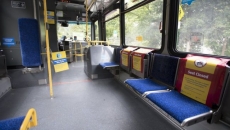Some southeast Asian leaders see Canada as an anchor for peace in the Indo-Pacific region, as they launch a new strategic partnership at a time when tensions continue to mount over territorial claims in the South China Sea.
"As a strategic partner, I hope Canada can become an anchor for peace and stability in the region that respects international law, and that encourages co-operation that are more concrete and inclusive, in particular in the Indo-Pacific region," said Indonesian President Joko Widodo as he welcomed Canada into a new strategic partnership on Wednesday.
The partnership with the Association of Southeast Asian Nations is considered a symbolic gesture that reflects Canada's expanded presence in the Indo-Pacific region. Trudeau, in a speech to ASEAN leaders Wednesday, said it shows the progress being made on a free-trade agreement between Canada and the 10-nation bloc.
"We share clear commitments to peace and stability, openness and transparency, to development and economic co-operation, and to an understanding that international rules are essential for growth," Trudeau said.
Secretary-General of ASEAN Dr Kao Kim Hourn attended the 26th ASEAN-Canada Summit in Jakarta today which announced the ASEAN-Canada Strategic Partnership. The meeting also adopted a Joint Leaders’ Statement on ASEAN-Canada Strategic Partnership. pic.twitter.com/z2YHSocATz
— ASEAN (@ASEAN) September 6, 2023
Trudeau has been meeting with leaders this week on the sidelines of the annual ASEAN summit.
China, Taiwan and some ASEAN member states -- Brunei, Malaysia, the Philippines and Vietnam -- have for decades been locked in an increasingly tense territorial standoff in the South China Sea, where a bulk of global trade transits.
China has upset many countries in the Asia-Pacific region after it released a new official map that lays claim to most of the South China Sea, as well as to contested parts of India and Russia.
Most of the governments disputing China's claims in the South China Sea are ASEAN members. India, meanwhile, is hosting the G20 talks later this week, which Trudeau is set to attend.
Earlier in the day, Trudeau held private meetings on the sideline of the summit with leaders of Malaysia, Vietnam, Korea, Philippines and Australia.
During Trudeau's meeting with Prime Minister of Vietnam Pham Minh Chinh and Malaysian Prime Minister Anwar Ibrahim, the leaders separately discussed their commitment to defending the rules-based international order and having a free and open Indo-Pacific region, said a read out from the prime minister's office.
Trudeau also expressed interest to ASEAN leaders that Canada would like to join the East Asia Summit and the ASEAN Defense Ministers Meeting Plus, which strengthens security and defence co-operation for peace, stability, and development.
A joint statement between Canada and the 10 southeast Asian countries on Wednesday lays out a commitment to tackle global food insecurity and nutritional needs together. It’s part of Canada's commitment to invest in the Indo-Pacific region on green infrastructure and supply chain resilience, especially around food supply.
Delivering a speech at the ASEAN-Indo-Pacific Forum, Trudeau said Canada is focused on investing in renewable energy, sustainable energy and water projects within the region.
Trudeau also pitched Canada as a reliable supplier of natural resources like fertilizer and critical minerals, saying Canada has the clean energy the world needs to help with their green energy transition.
The prime minister has been well received at the summit, with South Korean President Yoon Suk Yeol calling Trudeau a close friend, and someone he always wants to run into.
In the evening, Trudeau is set to attend a dinner with the Indonesian president before taking off to Singapore on Thursday, then to the G20 Summit in New Delhi later this week.






